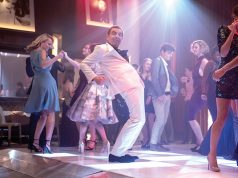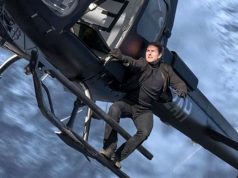There aren’t many franchises that this applies to, but if anyone ever needs advice on how to make a 50-year-old movie series seem fresh and relevant again, “Skyfall” is the model. James Bond’s 23rd outing, in which he is once again played by a steely-eyed Daniel Craig, is an explosively entertaining mix of old and new, giving the die-hard fans what they want without ignoring the problems associated with a character who’s been around for half a century.
Directed by Sam Mendes (“American Beauty,” “Road to Perdition”), “Skyfall” completes the reboot that began with “Casino Royale” and continued in “Quantum of Solace.” (Two of those films’ screenwriters, Neal Purvis and Robert Wade, are back, joined by “Rango” and “The Aviator” scribe John Logan.) Agent 007 dwells in the modern world now, with threats more realistic and complex than a cat-fancying, volcano-dwelling megalomaniac or a three-nippled sharpshooter. What’s more, the James Bond movies live in the 21st century, viewed by audiences that have come to prefer realism (or at least an approximation of it) over campiness. We’re just not going to sit still for some cornball throwback unless it’s presented as a retro parody, like the “Expendables” movies. And nobody wants to see Bond reduced to that.
None of this is new information. “Casino Royale” and “Quantum of Solace” laid the groundwork for a down-to-earth Bond, the sort of government agent who seems like he could actually exist in real life. What “Skyfall” does is address head-on the thorny question of how to modernize 007 without rendering him completely unrecognizable — without taking all the fun out of him, basically. How do you find the right combination of old and new? As it turns out, the answer is pretty simple: keep what still works, replace what doesn’t.
In this outing, the entire MI6 organization is threatened when a list of secret agents is stolen by nefarious parties who intend to expose and/or kill the spies. The theft of something dangerous is a standard James Bond plot engine, but here it’s information rather than weaponry. Appropriately, the villain isn’t just a bomb-throwing terrorist but a cyberterrorist, a lunatic named Silva (Javier Bardem) with mad hacking skillz capable of bringing down the government and a grudge against MI6. (He’s not afraid to throw bombs, too.) Bond’s commander, the redoubtable M (Judi Dench), is already having her job sniffed at by one Gareth Mallory (Ralph Fiennes), a bureaucrat higher up the food chain who thinks MI6’s old-school cloak-and-dagger methods are antiquated. “We can’t keep working in the shadows,” he says. “There are no more shadows.” The latest breach in security puts M at even greater risk, both professionally and personally, and is seen by Mallory as confirmation of what he already thought: MI6 must adapt or die.
Sound like any movie franchises you know?
The new Quartermaster, or Q for short, represents Mallory’s modern way of thinking, a genius focused on computer technology rather than silly gadgets. (Bond without his jet-pack and exploding wristwatch? What madness is this??) The new Q is also new in the sense of being about one-third the age of his predecessors: played by Ben Whishaw in a hipster cardigan and boxy eyeglasses, he looks like he must have been a barista before landing the job with British Intelligence. He and Bond square off with semi-playful jabs about how Q’s too young and Bond’s too old before coming together on what is essentially the whole point of the movie: new innovations help us keep with the times, but sometimes the old ways are best. An intricate computer virus can cause untold devastation in the modern world, but you know what else does a lot of damage? A good old-fashioned knife in the throat.
Without belaboring the point, “Skyfall” keeps the idea of old vs. new — and the question of whether it should even be “vs.” — at the forefront of our minds. Frequently it’s on the surface, as in the instances mentioned, but often it’s ingeniously subtextual, as when elements of the classic Bond formula surface without anyone calling attention to them. Silva is a modern madman, but he’s also a villain in the old Bond tradition, with physical oddities and an insatiable bloodlust. (He’s also brought to life by a deliriously snide Javier Bardem.) He brings the “Bond villain” archetype into the 21st century in much the same way that the Joker did it for Batman in “The Dark Knight.”
Bond’s relationship with M is a crucial component of the film, keeping things intimate even when there is large-scale mayhem. Bond is also smiling a lot more these days than in the last two chapters, sparring with Q and fellow field agent Eve (Naomie Harris), giving M grief, even getting off a wry one-liner here and there.
The one drawback to putting 007 in the real world is that it makes us expect, well, realism — something no one ever demanded when Bond was going into space or surfing into North Korea. A lapse in plot logic is more glaring when you’ve set such high standards for yourself, and there are some here. Yet from the dynamite opening sequence (a franchise high point) to the globe-trotting espionage; from the hand-to-hand combat to Bond’s resourceful use of weapons; from the exotic ladies in Bond’s bed to M, Eve, and Q in his heart, “Skyfall” packs more sheer, satisfying entertainment into its runtime than any Bond film before it. It’s not just a terrific Bond movie; it’s a terrific movie, period.
A- (2 hrs., 23 min.; )
I did a bunch of other James Bond stuff in conjunction with "Skyfall":
- Randy Newman's Title Song from 'Skyfall.'
- Quiz: Female Character in a James Bond Film, or Drag Queen Name We Made Up?
- 007 By the Numbers: a ridiculous and in-depth statistical analysis, part 1 and part 2.





